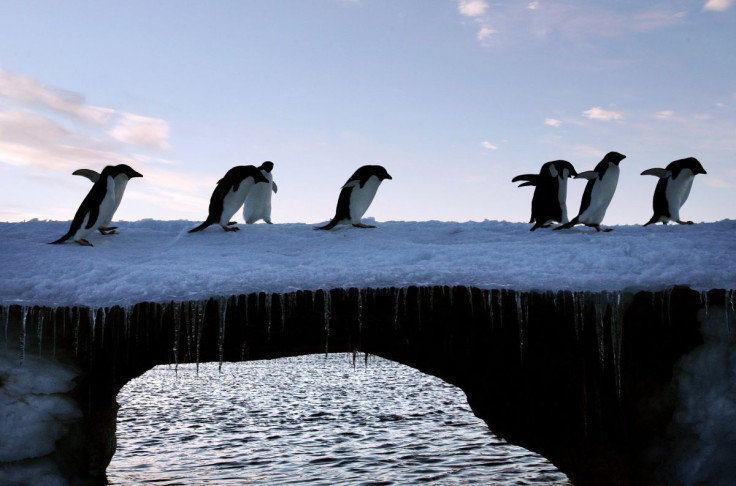Mirror Test On Wild Adélie Penguins Reveals The Adorable Birds May Be Self-Aware
KEY POINTS
- Researchers conducted the mirror tests on wild Adélie penguins
- The animals' reactions imply that they didn't think their reflections were other penguins
- Results of the tests reportedly "suggest that Adélie penguins are possibly self-aware"
Another species may have just passed the mirror test, showing signs of self-awareness: wild Adélie penguins.
Researchers of a recent study, which is available on the preprint server bioRxiv, conducted varieties of the mirror test on wild Adélie penguins. The idea was to try to determine how they would react to themselves in the mirror, thereby getting clues as to whether they possessed self-awareness.
The mirror test, devised in 1970, has been used as a means to determine whether certain animals have the capacity for self-awareness based on their ability to recognize themselves in the mirror.
In the original experiment, for instance, four chimpanzees that had been exposed to their mirror reflections and were marked with a red dye on a part of the body they couldn't directly see tried to touch the mark on their own bodies after seeing their reflections. This reportedly suggested that they recognized the ones in the mirror as themselves.
Other creatures that passed the test include Asian elephants, bottlenose dolphins, great apes, pigeons, magpies and, only recently, the cleaner wrasse fish.
But what about penguins? To find out, the researchers went to Svenner Island in Antarctica from January to February 2020 and conducted several experiments, Phys.org reported. The island is home to about 3,500 Adélie penguins, so it was an ideal place to conduct the study.
In the first one, the researchers simply placed mirrors on the ground around the wild penguins and observed them. In the second one, they placed a cardboard corral that led the penguins to the mirror, while the third one involved placing green stickers on the mirror so that parts of the penguins' images would be obstructed by the sticker if the animals looked at the mirror. For the fourth and final experiment, the researchers placed colored bibs on adult penguins and observed their behavior in front of the mirror.
The penguins did not react to their reflections in the first study, with many simply staring at the images without attempting to touch them. This is telling of their capabilities, according to Phys.org, as other animals may have reacted to their reflection, believing that it's another creature of their species.
In the second and third tests, the penguins made movements as though they were exploring their self-images when exposed to the mirrors.
"(S)trikingly, the visual attention of all the subject penguins was firmly on their images during the entire timespan of their performance," the researchers wrote.
"Our observation that the penguins stared intently at the simultaneous body movements of their mirror images, as they proceeded to move their heads or other body parts, coupled with a singular lack of any kind of tactile reaching out or aggression directed toward the mirror images, suggested to us that the individuals possibly did not consider the images to represent other conspecific individuals," they added.
And when the sticker was obstructing their reflections, the penguins engaged in pecking movements directed at the sticker, which researchers interpreted as the penguins attempting to remove it so they could see the full images they had seen earlier. Although it's also possible, they said, that the restlessness the penguins had when the sticker was on the mirror was because they could not see the eyes in the mirror, citing the importance of social gaze in nonhumans.
In the fourth test, however, the penguins didn't respond even when they were fitted with the colored bibs. But it's unclear if this was because they did not actually respond to the bibs or if they "failed to notice" the bibs while in their restless state, as there has been evidence to suggest that some penguin species may be sensitive to some colors but not others. According to the researchers, "such experiments should be better designed in the future."
"We believe that this set of experiments constitutes possibly the first investigations into the potential presence of self-awareness in any penguin species," they wrote. "Our investigations lead us to tentatively suggest that Adélie penguins are possibly self-aware, as indicated by their responses to their own images in a mirror and argue that such self-awareness may play a critical role during the various communal activities and social interactions that individuals of this avian species typically engage in."
Further investigations could confirm their findings, the researchers said.

© Copyright IBTimes 2025. All rights reserved.






















